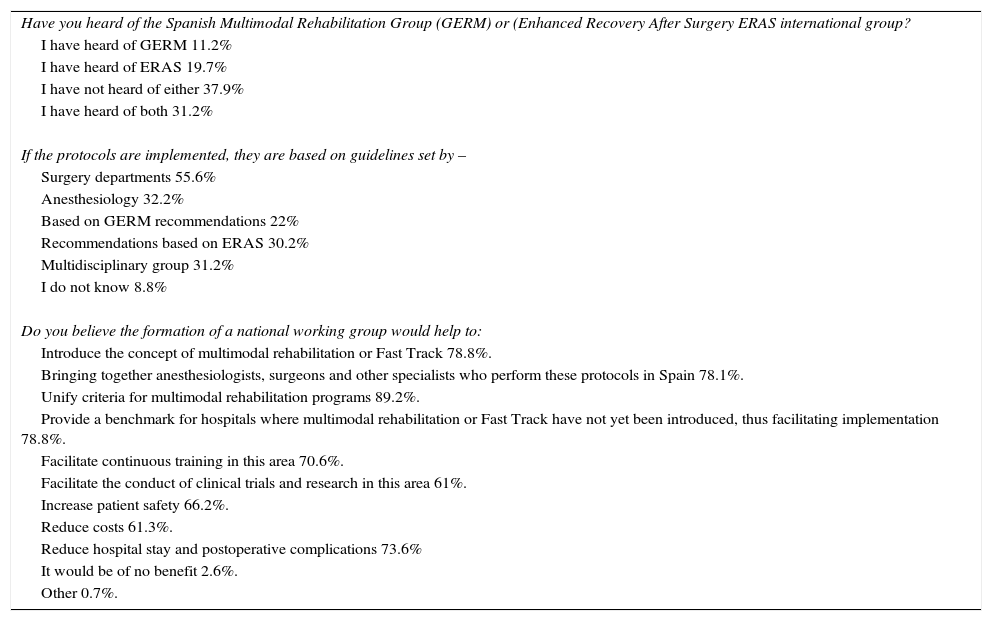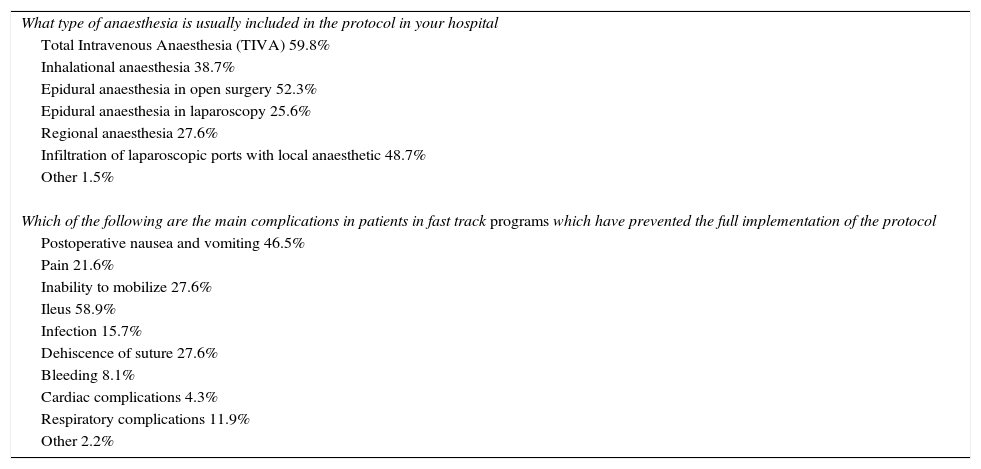The aim of this study was to determine the interest in ERAS protocols, and the extent to which clinicians are familiar with and apply these protocols during perioperative care.
Materials and methodsFree access survey hosted on the Spanish Society of Anesthesiology and Critical Care; Spanish Association of Surgeons and Spanish Society of Enteral and Parenteral nutrition and ERAS Spain (GERM) websites conducted between September and December 2014.
ResultsThe survey was answered by 272 professionals (44.5% anaesthetists, 45.2% general surgeons) from 110 hospitals, 73% of whom had experience in ERAS protocols. Most (86.1%) had specific knowledge of ERAS protocols, whereas only 50.9% were familiar with ERAS recommendations and 42.4% with GERM recommendations. Most (73.1%) respondents reported that ERAS protocols are performed in their hospitals, mainly in colorectal surgery (93%), and 52.2% reported that GERM/ERAS recommendations are followed. Nearly all (95.5%) would be interested in the development of multidisciplinary national guidelines. Less than half (46.6%) perform preoperative nutritional assessment, albeit without a universal malnutrition screening method (56.8%). Preoperative loading with carbohydrate drinks is carried out in only 51.4% of cases; nasogastric tube and drainage are avoided (79.3%), prophylaxis for postoperative nausea and vomiting (73.4%), goal directed fluid therapy (73.3%), and active normothermia maintenance (87.4%) are performed. In most cases, mobilization (90.1%) and early feeding (87.9%) are performed. The leading causes of protocol failure are postoperative nausea and vomiting (46.5%) and ileus (58.9%).
ConclusionClinicians in Spain are familiar with fast track protocols, although there is no overall consensus, and hospitals do not adhere to existing guidelines. Overall compliance with the items of the protocol is adequate, although perioperative nutritional management is poor.
El objetivo de este estudio fue examinar el interés, el conocimiento y el cumplimiento de los protocolos ERA en cuidados perioperatorios.
Materiales y métodosEntre septiembre y diciembre de 2014 se realizó una encuesta de libre acceso desde las webs de la Sociedad Española de Anestesiología y Reanimación, la Asociación Española de Cirujanos, la Sociedad Española de Nutrición Enteral y Parenteral, y ERAS España (GERM).
ResultadosRespondieron 272 profesionales (44,5% anestesiólogos, 45,2% cirujanos) de 110 hospitales, el 73,1% con experiencia en protocolos ERAS. Conocía específicamente los protocolos ERAS un 86,1%, aunque solo el 50,9% conocía las recomendaciones ERAS y el 42,4% las españolas (GERM). Además, el 73,1% de sus hospitales realizaban protocolos ERAS, principalmente en colorrectal (93%), según recomendaciones GERM/ERAS (52,2%). Un 95,5% mostró interés en desarrollar guías nacionales. El 46,6% realizaron evaluación nutricional preoperatoria, aunque no existiera un método de cribado universal de desnutrición (56,8%). La carga preoperatoria con bebidas carbohidratadas se realizó en el 51,4%; se evitaron sonda nasogástrica y drenajes (79,3%), profilaxis de náuseas y vómitos postoperatorios (73,4%), terapia dirigida por objetivos de líquidos (73,3%), mantenimiento de normotermia activa (87,4%). La mayoría realizó movilización (90,1%) y alimentación temprana (87,9%). Las principales causas de fracaso del protocolo fueron las náuseas y vómitos postoperatorios (46,5%) y el íleo (58,9%).
ConclusiónLa realización de protocolos de recuperación intensificada sería conocida en España, aunque no parece existir un consenso ni se realizan según las guías. El cumplimiento general de los elementos del protocolo sería adecuado, aunque exista un déficit en el manejo nutricional perioperatorio.












